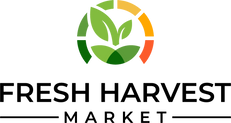Thirteen Powerful Herbal Antibiotics and Their Uses
Posted by Fresh Harvest Market on 23rd Jul 2024
Here are thirteen powerful herbal antibiotics known for their antimicrobial properties and can be a valuable part of a natural health regimen.
- Garlic (Allium sativum)
- Use: Fresh garlic cloves can be eaten raw or cooked. Garlic supplements are also available in the form of capsules or tablets.
- Application: Consuming 1-2 raw cloves daily for immune support; use in cooking for added benefits.
- Oregano (Origanum vulgare)
- Use: Oregano oil can be diluted and applied topically or taken internally.
- Application: Mix a few drops of oregano oil with a carrier oil (like coconut oil) for skin infections. For internal use, add 1-2 drops of oil to water or juice.
- Ginger (Zingiber officinale)
- Use: Fresh ginger root can be used in teas, smoothies, or cooking. Ginger supplements are also available.
- Application: Make ginger tea by boiling slices in water for 10-15 minutes. Consume 2-3 times daily for antibacterial benefits.
- Echinacea (Echinacea purpurea)
- Use: Available as a tea, tincture, or capsule.
- Application: Drink echinacea tea or take tincture drops (according to package instructions) to help fight infections and boost immunity.
- Goldenseal (Hydrastis canadensis)
- Use: Available in capsules, tinctures, or teas.
- Application: Take as directed on the product label, usually in capsule or tincture form, for respiratory and digestive infections.
- Turmeric (Curcuma longa)
- Use: Fresh turmeric root can be used in cooking or as a tea. Turmeric supplements are also available.
- Application: Add turmeric powder to food, or make a tea by boiling turmeric slices. Take supplements as directed for antibacterial and anti-inflammatory effects.
- Thyme (Thymus vulgaris)
- Use: Thyme oil can be used topically or inhaled. Fresh thyme can be used in cooking.
- Application: Dilute thyme oil with a carrier oil and apply to the skin, or inhale the vapor from thyme-infused steam to treat respiratory infections.
- Cinnamon (Cinnamomum verum)
- Use: Cinnamon sticks or powder can be used in cooking or teas. Cinnamon oil is also available.
- Application: Add cinnamon to your diet regularly. Use cinnamon oil diluted with a carrier oil for topical applications.
- Clove (Syzygium aromaticum)
- Use: Clove oil can be applied topically or used in dental care. Whole cloves can be used in cooking.
- Application: Dilute clove oil and apply to the skin or gums. Use whole cloves in food for their antimicrobial properties.
- Manuka Honey
- Use: Can be applied topically or consumed.
- Application: Apply directly to wounds or infections on the skin. Take 1-2 teaspoons daily to help fight internal infections.
- Olive Leaf (Olea europaea)
- Use: Available as a supplement or tea.
- Application: Take olive leaf extract capsules or drink olive leaf tea as directed to support immune function and fight infections.
- Neem (Azadirachta indica)
- Use: Neem oil and leaves can be used topically or taken internally.
- Application: Apply neem oil to the skin for infections. Neem leaf tea can be consumed, but consult with a healthcare provider for internal use due to its potency.
- Eucalyptus (Eucalyptus globulus)
- Use: Eucalyptus oil can be inhaled or applied topically.
- Application: Add a few drops of eucalyptus oil to a diffuser or steam inhalation for respiratory infections. Dilute with a carrier oil for skin application.
Usage Tips
- Consultation: Always consult with a healthcare provider before starting any herbal treatment, especially if you have underlying health conditions or are taking other medications.
- Dosage: Follow recommended dosages on product labels or advice from a healthcare provider.
- Allergies: Be aware of any potential allergies to herbs or their components.
These herbs are known for their antimicrobial properties and can be a valuable part of a natural health regimen.

